► The CAR guide to the new best seven-seater hybrid cars
► Practical, spacious and economical seven-seaters available now
► From outright frugal options to high-performance choices
If you have a larger family, or regularly need to travel with lots of passengers, you may well be considering a seven-seater hybrid car. And, given the fluctuating cost of fuel and the increasing prominence of ultra-low emissions zones, a more efficient seven-seater hybrid could well be at the top of your list.
The most practical option would historically have been an MPV but, for most people the best hybrid SUVs seem to do it all. The result? Many a manufacturer is winding up its MPV offerings. That leaves you with three options that should be within you budget, and we have guides for all of them. Check out our guide to the best used hybrid SUVs.
EDITOR’S PICK: The SUVs on this list are great, but moving seven people in space and comfort is everything the Volkswagen Multivan was designed for.
The best hybrid cars give you good electric range with the flexibility of an ICE, and the best seven-seater hybrid cars combine that peace of mind with serious people-moving capacity. There are pros and cons of hybrids, but if you’ve got places to be, with lots of passengers and you want good efficiency, you’re in the right place. Read on to find out more about the best seven-seater hybrid cars on sale in the UK in 2025.
The best seven-seater hybrid family cars of 2025
Nissan X-Trail e-Power
Best for a bit of off-road
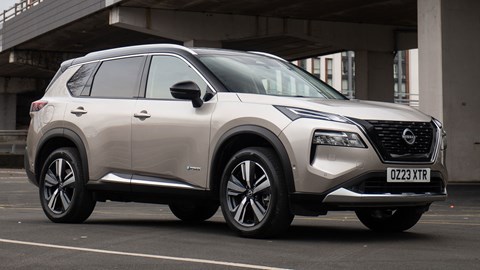
- Sensible seven-seat family transport
- e-Power hybrid and e-4ORCE AWD
PROS: Sensible, comfortable
CONS: Could be more spacious
When a Qashqai just won’t cut it for family duties, you need to step up to an X-Trail. The latest generation, which made its debut late last year, is offered in five- and seven-seat configurations, the latter of which can be had with the brand’s e-Power full hybrid system and all-wheel drive.
The X-Trail packs a combined 210bhp and can accelerate from 0-62mph in a swift 7.2 seconds and, when driven sensibly, Nissan claims a combined average of some 44mpg. A less expensive mild hybrid is also available, if you’re looking for something less expensive, but it’s not as effective and only available in two-wheel-drive form. It isn’t the most spacious of seven-seat SUVs, but it’s comfortable, comes with lots of kit, is put together well and is agreeable to drive.
Read our Nissan X-Trail review
Ford S-Max Hybrid
Best for driving dynamics
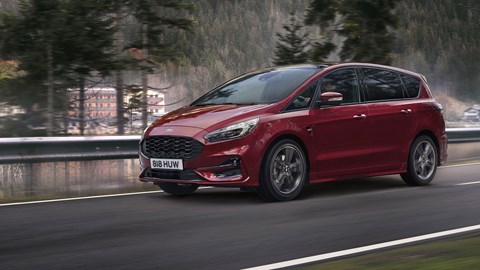
- Ageing MPV still worthy of your attention
- Petrol-electric hybrid offers up to 43.5mpg
PROS: Great to drive
CONS: Boot is small if you use the folding seats
Just because you’re buying something family-oriented doesn’t mean you have to do away with any driving pleasure. Ford’s S-Max, for example, has long been regarded as a seven-seat MPV that’s both eminently practical and gratifying to drive. It was launched back in 2015 but, despite the shifts in manufacturer line-ups and buyer preferences, it’s still available – and, in 2021, a 2.5-litre petrol-electric hybrid version was added to the range.
It’s currently available in one of three grades but even the base Titanium model comes with features such as a heated front screen, lane-keeping assistance, dual-zone climate, cruise control and front and rear parking sensors. One of the few downsides is that the rearmost row is a little cramped, but then there’s always the larger Ford Galaxy if you really need that extra room.
Read our Ford S-Max long-term review
Toyota Highlander
Best for comfort and refinement
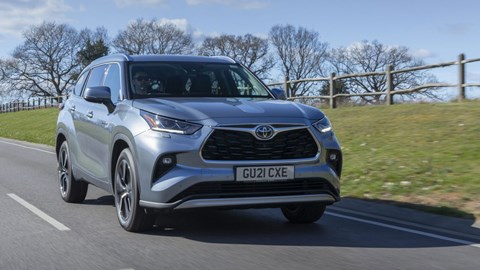
- Large hybrid SUV with lots of equipment
- Petrol hybrid averages nearly 40mpg
PROS: Reliability and fuss-free ownership, 100,000-mile warranty, off-road skills
CONS: Not as luxurious as some
If reliability and fuss-free ownership are key criteria for you, the new Highlander could be a great choice. Aside from Toyota’s reputation for producing reliable and long-lasting cars, it now offers a ten-year, 100,000-mile warranty scheme called Toyota Relax.
But opting for a seven-seat Highlander isn’t only made justifiable by its warranty; the big SUV comes with lots of equipment, including adaptive cruise, a premium audio system and LED lights, and it’s comfortable, practical and pleasing to drive. Its hybrid system blends petrol and electric power to excellent effect, serving up a combined claimed average of nearly 40mpg and a 0-62mph time of 8.3 seconds. It also comes with all-wheel drive as standard, thanks to an electrified back axle, which could prove useful to those looking to venture into the rough occasionally.
Read our Toyota Highlander review
Ford Galaxy Hybrid
Best for good value MPVing
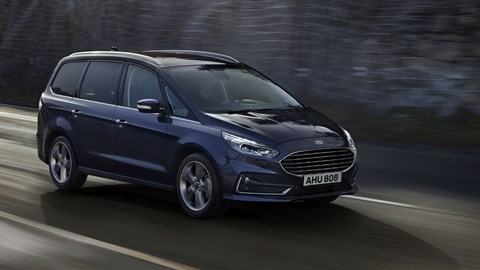
- Roomy hybrid MPV that majors on comfort
- Less expensive than some SUV alternatives
PROS: So, much, space
CONS: Not the most dynamic
If you’re looking for a proper people carrier that can accommodate seven adults, make a beeline for the long-standing Ford Galaxy. It offers stacks of space inside that, coupled with numerous storage points and flexible seating, makes it far more adept at carrying multiple passengers and their accoutrements than many a comparable seven-seat SUV. It is getting a bit long in the tooth, mind, but three-row MPVs are few and far between now, and it’s otherwise a comfortable, refined and mature-feeling car.
The hybrid version, which was introduced in 2021, is claimed to average up to 44.1mpg and can drive for short distances on electric power alone. The 2.5-litre engine and electric motor also put out enough punch to grant a 0-62mph time of 10 seconds, which should prove adequate for most.
Read our Ford Galaxy review
Dacia Jogger Hybrid 140
Best for value
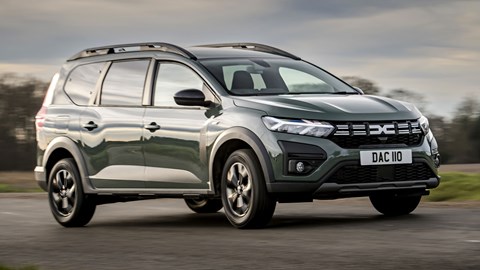
- Latest Dacia is great value for money
- Impressively practical and likeable
PROS: Great value and good mpg figures
CONS: Not much – some will want more luxury
The budget-minded brand Dacia has come on leaps and bounds since it landed in the UK in 2013. Its range has expanded, its cars have become more capable and desirable, and it’s now sold north of 240,000 cars in this country alone.
The Jogger is the latest addition to its roster, offering seven seats and an appealing blend of MPV and SUV traits. It’s no bare-bones option, either; go for an Expression version and you’ll get features such as blind spot warning, rear parking sensors and a camera, climate control and Android Auto and Apple CarPlay support. And, yes, it’s offered as a hybrid – one that reputedly averages 56.5mpg on the more realistic WLTP test cycle and one capable of travelling up to 43mph on electric power alone.
Read our Dacia Jogger review
Hyundai Santa Fe Hybrid & Plug-in Hybrid
Best for sensible practicality
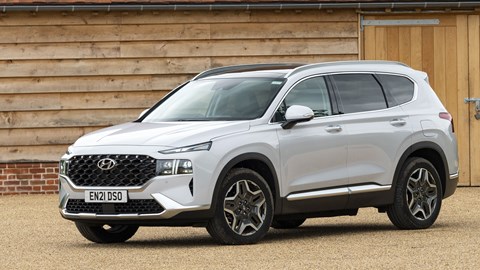
- A plush, practical seven-seat hybrid
- Capable plug-in version also available
PROS: Lots of space and practicality
CONS: Not the most engaging
The Hyundai Santa Fe is a large seven-seat SUV that’s offered in both hybrid and plug-in hybrid formats, giving you a bit more flexibility with regard to budget. The latter will allow you to drive for up to 36 miles on battery power alone, potentially seeing your daily trips completed in frugal silence, and is capable of 0-62mph in 8.8 seconds. It also comes with all-wheel drive as standard, which could be useful if you occasionally need to call upon additional traction. It’s admittedly not the quickest or most engaging hybrid SUV around, but compensation comes in the form of a lower price. And then there are factors such as its five-year, unlimited-mileage warranty, which further serve to make it an easy SUV to own.
Read our Hyundai Santa Fe review
Range Rover Long Wheelbase
Best for the new luxury SUV benchmark
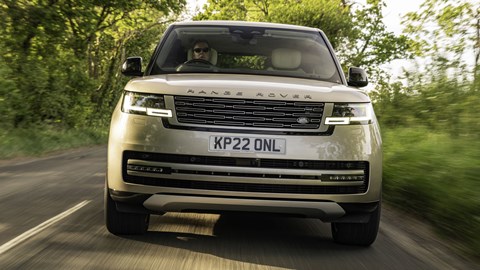
- Land Rover’s incredible flagship SUV
- Choice of petrol and diesel mild hybrids
PROS: The benchmark for luxury SUVs
CONS: Not the best mpg
Want a terrifically luxurious seven-seat SUV and have budget to burn? Then consider a long-wheelbase version of the latest iteration of Range Rover. You’ll pay north of £100,000, that’s for sure, but what you’ll get for your money is a fantastically finished and capable premium SUV that is capable both on the road and off it.
Okay, so the seven-seat model is only available in a mild hybrid form at the moment, so the electrical assistance and advantages are only slight, but you can choose between petrol and diesel options of various outputs. Opt for the petrol P400, for example, and you’ll get a Range Rover capable of 0-62mph in 6.1 seconds – and yet, despite its heft and capabilities, it’ll potentially knock on the door of 30mpg. Not that its economy will trouble most buyers, given the price of admission.
Read our Range Rover review
Volkswagen Multivan eHybrid
Best for easily taking seven
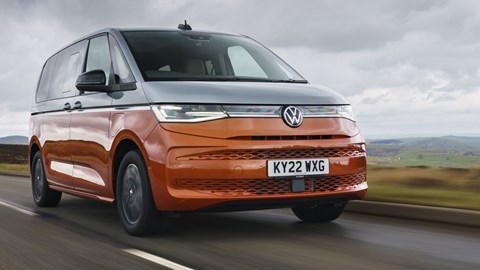
- New MPV seats seven with ease
- Up to 30 miles on electric power alone
PROS: So much space for the size
CONS: Some may dislike the exterior
If you’ve been seeking seven-seat vehicles that are immensely practical, you may well have encountered options such as the Toyota Proace Verso and Citroen SpaceTourer. These van-based people carriers offer up vast amounts of space and useful seating configurations, but many lag far behind car-based alternatives in terms of technology, driving dynamics and desirability.
The smartly styled and appointed new VW Multivan, while looking like a van, is however based on the MQB car platform that underpins myriad Volkswagen Group offerings. This helps make it easier and more enjoyable to drive, and makes it feel far less like a big ol’ bus. You can pick from two lengths and multiple seating configurations, too, along with a whole host of options – including triple-zone climate control, electric sliding doors and heated seats. It ticks the hybrid box, too; a plug-in eHybrid model is available, which offers up to 30 miles of all-electric range.
Read our Volkswagen Multivan review
Volvo XC90 Recharge
Best for understated performance
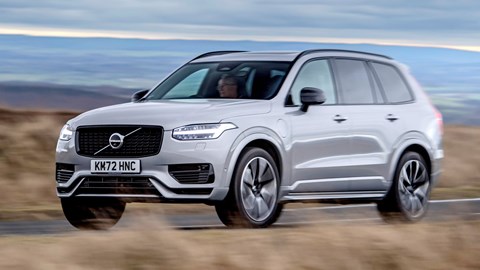
- Long-standing seven-seat luxury
- EV mode offers up to 41 miles
PROS: Understated class in performance, safety and luxury
CONS: Getting old, and there’s an EX90 on the way
The second-generation Volvo XC90 is admittedly getting on a bit now, and its all-electric successor is just around the corner. However, if you’re looking for a seven-seater plug-in hybrid, it’s still well worth considering. The current petrol-electric XC90 Recharge offers up an all-electric range of 41 miles, combined CO2 emissions of 28g/km, and a claimed average of 235.4mpg – although, predictably, you’ll probably average more like 35.4mpg unless you’re committed to relying on internal combustion as infrequently as possible.
But even if your usage does cause it to dip that low, it’s still not bad going for a 2.3-tonne SUV that’s capable of 0-62mph in 5.4 seconds. And there’s more to it than just its performance; the XC90 is handsome, impressively practical, spacious, finely finished and relaxing to drive. Just try to get one with air suspension, if your budget permits.
Read our Volvo XC90 Recharge review